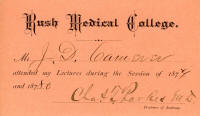Charles
T. Parkes, M.D.

Click on image to enlarge
Go to lecture card display
Name: Charles
T. Parkes
Cause of death: pneumonia
Death date: Mar 28, 1891
Place of death: Chicago, IL
Birth date: 1847
Place of birth: Troy, NY
Type of practice: Allopath
Practice specialities:GS General Surgery
Professorship: Rush Medical College, Chicago, surgery
Journal of the American Medical Association Citation: 16:500 |
Parkes, Charles T.
(1842-1891).
Charles T. Parkes had
remarkable success as a teacher of anatomy, and a clear and
concise method of demonstration which not only excited
enthusiasm and love in all his students, but gained for him a
wide reputation.
He was born August 19, 1842,
at Troy, New York, the youngest of ten children. His father,
Joseph Parkes, an Englishman, came to Chicago in 1860. At that
time the son was a student in the University of Michigan, where
he afterwards received his A. M. He enlisted in, the army in
1862 as a private and was discharged three years later as
captain.
At the close of the war he
returned to Chicago, and began to study medicine under Dr. Rae,
professor of anatomy in Rush Medical College. He graduated from
this college in 1868, and was at once appointed demonstrator of
anatomy, which position he held until his appointment as
professor of anatomy in 1875.
His specialty was abdominal
surgery in which he was a pioneer investigator.
The first to advocate uniting severed intestines; he in this
antedated Drs. Senn and Murphy. For the purpose of gaining a
better knowledge of both the consequences and treatment of
gunshot wounds of the intestine he made a series of experiments
on forty dogs. The number of recoveries astounded the medical
profession and lead to further experiments in all parts of the
world. He made his first report at a meeting of the American
Medical Association in Washington, 1884. He took with him three
specimens of intestine and a living dog from which he removed
five feet of intestine perforated by bullet wounds. His work in
the surgery of the gall-bladder, which was then in its infancy,
was no less conspicuous in influencing new lines of treatment.
Preceding Parkes' there were not twenty-five ideal
cholecystotomies. He recognized the practical place of surgery
in the relief of common maladies.
Always a student, he read
much, loved old books and also kept in touch with the
continental medical schools. For several years before his death
he had been accumulating material for works on general and
abdominal surgery but his sudden death stopped the writing. The
writings he left were published under "Clinical Lectures," but
there were some fifty or more besides what appeared in the
current medical journals and of which a partial list can be seen
in " Distinguished Physicians and Surgeons of Chicago," F. M.
Speery, 1894.
He married, in 1868, Isabella
J. Gonter- man and had two children, Charles Herbert and Irene
Edna. The son became, like his father, a surgeon.
Among his appointments he
was: attending surgeon to the Presbyterian Hospital;
surgeon-in-charge of St. Joseph's Hospital; surgeon-in-chief to
the Augustana Hospital; consulting surgeon to the Hospital for
Women and Children, and professor of surgery in the
Chicago Polyclinic. He held
also the presidency of the Chicago Medical Society and of the
Chicago Gynecological Society. In 1887 he was elected professor
of surgery—successor to Prof. Moses Gunn— and in this position
he was gaining wide renown at the time of his death, which
occurred after a short illness from pneumonia, March 28, 1891.
____________________
Dr. Charles T. Parkes, one of
the best known surgeons of Chicago died, March 28th, of pneumonia, aged
forty-eight. Dr. Parkes was born in Michigan, and graduated from the
Rush Medical College. In 18tiH he became demonstrator of anatomy in that
institution, in 1875 he was made professor, and in 1SS5 became professor
of surgery. He was also surgeon to the Presbyterian Hospital, treasurer
of the Rush Medical College, and president of the Chicago Medical
Society. His sudden death, coming just at the commencement season, cast
a gloom over the graduating exercises of the largest class in the
history of the Rush Medical College.
|